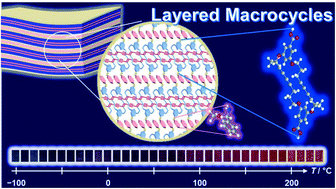Layered macrocycles with flexibility and tunable dynamic properties for wide-range thermoresponsive color changes†
Abstract
Layered materials exhibit unique properties, such as intercalation and exfoliation, originating from the two-dimensional anisotropic nanostructures. A variety of inorganic and organic layered materials have been synthesized for design of functions. However, conventional host layers are static and rigid to induce dynamic functions originating from the structural flexibility. The present work shows a new dynamic and flexible host layer based on organic macrocycles. A macrocycle containing functional, flexible, and intercalating units, namely macrocyclic diacetylene (MCDA), was designed to form a self-assembled layered structure. After the guest molecules were intercalated in the interlayer space, the host MCDA layers were topochemically polymerized to obtain polydiacetylene. The layered macrocycles containing the π-conjugated main chain and interlayer guests showed gradual thermoresponsive color changes in a wide temperature range of −100 to 230 °C with variation of the effective conjugation length. The flexible host layer affords induction of the dynamic motion of the intrinsically rigid π-conjugated main chain in the wide temperature range. Moreover, the thermo-responsivity was tuned by the intercalated guests. The color-change properties enabled real-time temperature imaging for medical applications. Flexible layered macrocycles can be a new design strategy of soft materials with dynamic functions.



 Please wait while we load your content...
Please wait while we load your content...